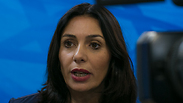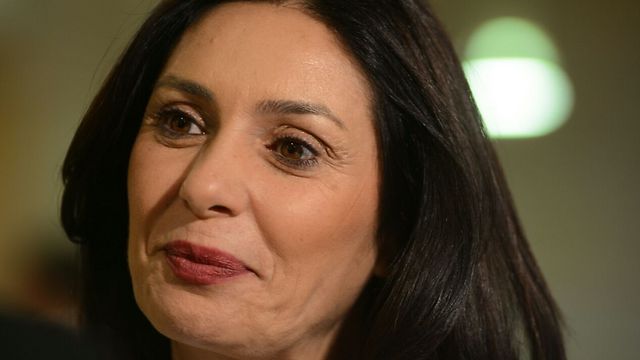
Culture and Sport Minister Miri Regev on Monday denied reports that her ministry had paid millions to ad agency Yehoshua/TBWA without any official tender.
Channel 10 News released voice recordings on Sunday night in which Regev was heard apparently discussing the issue with her confidants and trying to establish a mutual cover story to explain some NIS 2.5 million that had been paid to the agency without it having to compete for the contract.
Yehoshua/TBWA was hired to work on a media campaign to help parents find activities for their children during summer vacation. Regev, according to the report, failed to follow the proper process of issuing a tender, and instead paid the agency directly.
On Monday, Regev challenged Channel 10's report, saying: "So everyone who accused me of being an associate of his or accused him of being an associate of mine needs to prove that we were associates and that is now what I demand of Channel 10: For Channel 10 to prove my association with Rami Yehoshua," referring to the owner of the ad agency.
Regev even implied that she was considering a lawsuit against the station, saying she intended to send a letter to its attorneys that very day,
The tapes aired Sunday documented a conversation between Regev and at least two officials, in which they appeared to attempt to agree on which story to use. However, Regev stated on Monday that the recording captured a rehearsal for a press conference.
In the tape, when the first official suggested saying there had been a brainstorming session with several ad agencies at the minister's request, Regev responded: "No, no, no, not good! Not good! Bad, bad, bad answer!"
She then proposed claiming that Yehoshua/TBWA was selected because one of its clients, the Israel Sports Betting Board (ISBB), is part of the Culture Ministry.
The second official told her that this story was insufficient and further explanation was necessary.
As the discussion continued, the second official said: "We want to be careful so we are thinking about this ahead of time."
Eventually, the first official presented a solution that he said legal experts found acceptable: There was a brainstorming session and the winning idea was proposed by the ISBB, so the ad agency came along with the idea.
"Okay, excellent, excellent," said Regev.
However, media adviser Meir Suissa suggested improvements, and is also the only person heard expressing concern about whether the contract was approved according to the correct protocol. He said a professional explanation was required in addition to a legal one.
But the first official said: "No, no, there is a professional explanation. They had a winning concept! We loved it."
The participators settled on the final version: Regev had nothing to do with the matter, and Yehoshua/TBWA was brought in by the ISBB. However,Channel 10 provided evidence pointing at direct contact between the minister at the ad agency before the decision to provide the funds.
Soon after the report, Regev said the entire process was approved by lawyers "and was conducted lawfully, period."
The ministry itself, for its part, stated that it had requested ideas from ad agencies and PR firms with which it works regularly, and the best idea was suggested by the ISBB – "and therefore the campaign was created by this provider".
According to the ministry, the tapes were part of a media campaign that was not in service of the truth, but rather an excuse for journalists to cast aspersions.
Regev hit back at the report on Monday, saying: "The first time I met Rami Yehoshua was at a professional business meeting at the Ministry of Culture and Sports with all the professional parties and he arrived as a representative of the ISBB."
The minister went on to explain the circumstances of the recording. "The conference call was preparation for a press conference," she said. "In preparation for a press conference you run a simulation of different questions. Each person asks a question and we give a response to the simulated press conference. We were asked why we didn't do it through the Government Advertising Bureau, so I said the answer was very simple and that was to tell that truth, and it's good that that's on the tape. Telling the truth is always best."
Regev insisted that the ministry's funds "go through the budgets department via the ministry's legal adviser."

















